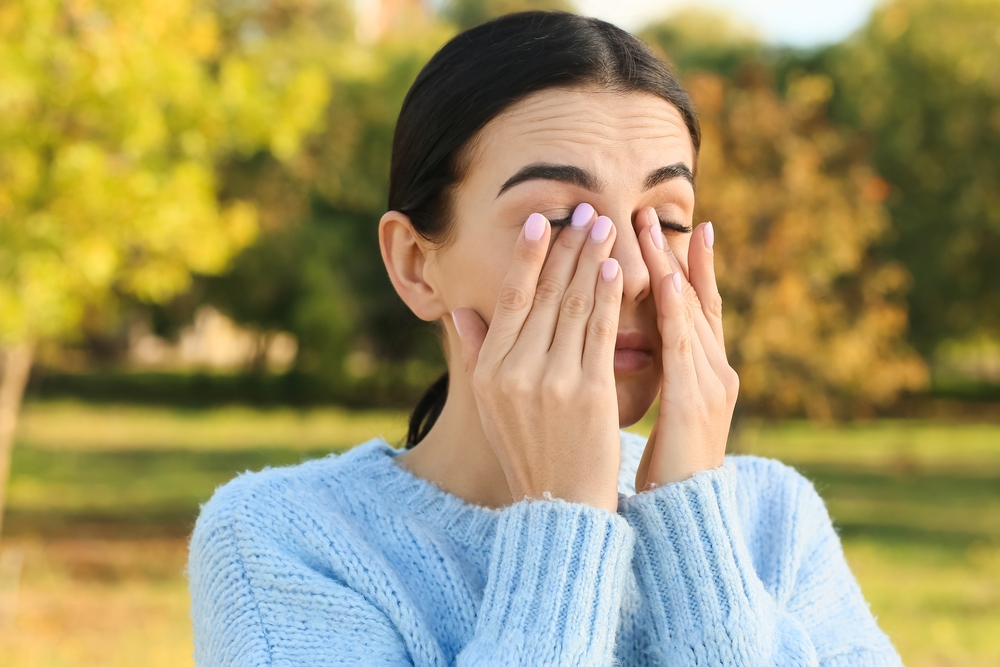
Our eyes are exposed to various environmental factors throughout the year, from UV rays in summer to dry, chilly winds in winter. Each season brings unique challenges to eye health, making it essential to adjust our eye care routines.
Combatting Allergies and Pollen
Springtime means blossoming flowers and blooming trees, but it also brings pollen—a common trigger for eye allergies. Symptoms like itchy, watery eyes and redness can make it difficult to see clearly and comfortably.
Wear Sunglasses: Sunglasses can help shield your eyes from airborne pollen, minimizing exposure to allergens.
Avoid Rubbing Your Eyes: Rubbing can worsen irritation and introduce more allergens into your eyes.
Use Eye Drops: Lubricating eye drops can wash away allergens and relieve dryness. Consult your optometrist for recommendations on allergy-specific drops.
Guarding Against UV Rays
In the summer, longer days mean more sun exposure, and our eyes need protection from the harmful effects of ultraviolet (UV) rays. Prolonged UV exposure increases the risk of eye conditions like cataracts and macular degeneration.
Invest in UV-Protective Sunglasses: Look for sunglasses that block 100% of UVA and UVB rays.
Wear a Hat or Visor: Additional shading from a wide-brimmed hat can reduce direct sunlight exposure.
Stay Hydrated: Keeping hydrated helps maintain tear production, preventing dry eyes during hot, sunny days.
Managing Seasonal Dryness
As temperatures drop and humidity levels fall, autumn brings drier air, which can lead to dry, itchy eyes. Indoor heating can further strip moisture from the air, making it challenging to maintain eye hydration.
Use a Humidifier: Adding moisture to the air helps prevent your eyes from drying out, especially in heated indoor spaces.
Continue Wearing Sunglasses: Protecting your eyes from dust and debris is essential, as windy conditions become more common.
Apply Artificial Tears: If your eyes feel dry or irritated, artificial tears can help restore moisture. Ask your optometrist to recommend a suitable product.
Safeguarding Against Dry, Cold Air
Winter presents a mix of dry indoor air and harsh outdoor winds that can sap moisture from your eyes. For those who enjoy winter sports, the reflective glare of snow can intensify UV exposure, posing an additional threat.
Wear Polarized Sunglasses: Polarized lenses reduce glare from snow and ice, making it safer and more comfortable for winter sports enthusiasts.
Limit Screen Time: With more time spent indoors, screen exposure can lead to digital eye strain. Take breaks to reduce strain on your eyes.
Protect Against the Wind: Wear goggles when skiing or participating in other outdoor activities to shield your eyes from cold winds.
The Importance of Regular Eye Exams Year-Round
While seasonal eye care practices are essential, it’s equally important to maintain regular eye exams all year. Comprehensive eye exams not only check your vision but also assess your overall eye health. Early detection of conditions like glaucoma, macular degeneration, or cataracts can help prevent vision loss and ensure that your eyes remain in optimal health throughout the seasons.
Consult Your Optometrist for Personalized Eye Care
Every person’s eyes respond to seasonal changes differently. We can provide personalized guidance and treatment recommendations tailored to your unique needs. Whether you’re dealing with seasonal allergies or need protection against UV exposure, consulting with an optometrist ensures you’re taking the right steps to protect your vision all year.
By adopting a proactive approach to eye care throughout the year and working with your optometrist, you can enjoy clear, healthy vision no matter the season. Schedule your next eye exam with Cleary Square Eyecare at office in Hyde Park, Massachusetts, by calling (617) 361-0618 today.




